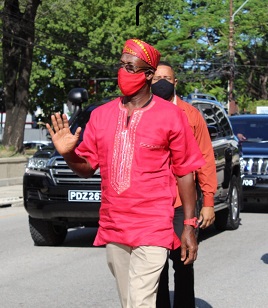
Greetings brothers and sisters.
I extend warmest sentiments on Emancipation Day 2022, to the African community on behalf of the Government and people of the Republic of Trinidad and Tobago, my family, and myself as Prime Minister.
Citizens, today as we scan the globe, we will realise that this occasion meets us at a most difficult time in the world’s natural history. Worldwide we are experiencing some unusually destructive weather patterns; wildfires, with thousands of acres uncontrollably alight in California and other states in North America, across the Atlantic in Spain, Greece and Portugal, with unprecedented heatwaves throughout Europe, droughts in Australia, contrasting with severe flooding in various other parts of the world — the effects of which should be viewed, by all citizens, not in the short term, but in a long-term planetary scale.
I draw this to the attention of the national community and the wider Caribbean, both as a reminder and a call to be further alert, in the same way, that calls are being made for national attention to be paid to a new wave of irrational violence across this country, and for further examination of our Security systems, our Judiciary, our education system and family life – all of which impact significantly upon the African community experience today.
Recently, I suggested that violence be considered a national public health emergency, and I have put in place a team of policy-makers, whom, I expect during their deliberations and, more so, in their conclusions and recommendations, will excite community discussions, among all groups across the country, from the bottom up. This wave of violence should not be seen as centred only among the African community, because the irrationality, as reported, appears to be the reflexes and impulsiveness of various pockets across the society.
Many are asking how did we get to this point, and what accounts for the rage among us, which, in a moment, turns to deathly violence. Some observers have suggested that the new wave is a consequence of the COVID-19 experience, a release of pent-up energy. If so, this adds to the multi-generational trauma that the African community experienced.
There has to be an acknowledgement that we are a people, who have been made to suffer for centuries, because of the colour of our skin, and whom some considered fitted, by an act of God, for only bondage. Our ancestors have been legally defined as three-fifths of a person, supported by laws that stated that it was legal to kill a slave “who raised a hand against a Christian”.
On new-world plantations, they suffered whippings until their skin fell off, fieldwork as everyday beasts of burden, denials of food and water, the rape of their women and separation of their children; overall, their treatment was worse than livestock. Then there were the psycho-social efforts on their minds to destroy their culture, their bonds, and their religion, which sought to strip away every aspect of their African spirit.
Over the centuries, the intense psychological distress and trauma – the worst experience in modern history – have left deep wounds. What we see in the down-side of the African communities today are expressions of that legacy, with feelings of detachment and estrangement, and misguided youths, alienated with little sense of a future, irritable, and quick in outbursts of anger.
What is required is an overall understanding of the African condition. There have to be conscious reminders that Africans are great people, who gave world civilisation some of its greatest kingdoms and empires when Europe was still in its Dark Ages. Millions died later in slavery, and that legacy continues in various forms – but there has to be a period of reconciliation and healing. We also have to understand some current social trends, e. g. modern consumer society promotes the immediate gratification; pushing people to want everything now, creating a Hobbesian state of “each against all”, plus the other dynamic of 21st-century technology, with the coming of artificial Intelligence, biotechnology and robotics etc.
As Africans, as citizens, we need to ask questions of ourselves.
Today, Emancipation Day is a good day. Go beyond the celebrations to reflect on the wave of violence in our communities; think of the African family, ask yourself whether we are good listeners to our children; for example, are we telling them that success comes from discipline, effort, patience, thrift, temperance and inner peace; that sharing is caring, and that there are opportunities in crises and lessons in adversity?
Are we encouraging them to be independently-minded, ambitious, respectful, and entrepreneurial with a mindset of “getting ahead”, rather than “getting by” and “getting along”? As parents, are we involved in their school-work and recreation, every evening, their school-activities, and making our voices heard in the education system and on all matters of patriotism?
Never forget your history. Seek to heal, remembering that only the strong forgive, never the weak. Most important, as Africans, we have to go forward, remembering that this is a multi-cultural land, with a narrative of inclusiveness and equality for all, with national watchwords of Discipline, Production and Tolerance.
Happy Emancipation Day
File photo
Contact the Office of The Prime Minister
It is advised that all queries should be written to the Office of the Prime Minister using the below address:
13-15 St Clair Avenue
Port of Spain, Trinidad
Tel: (868) 622-1625


